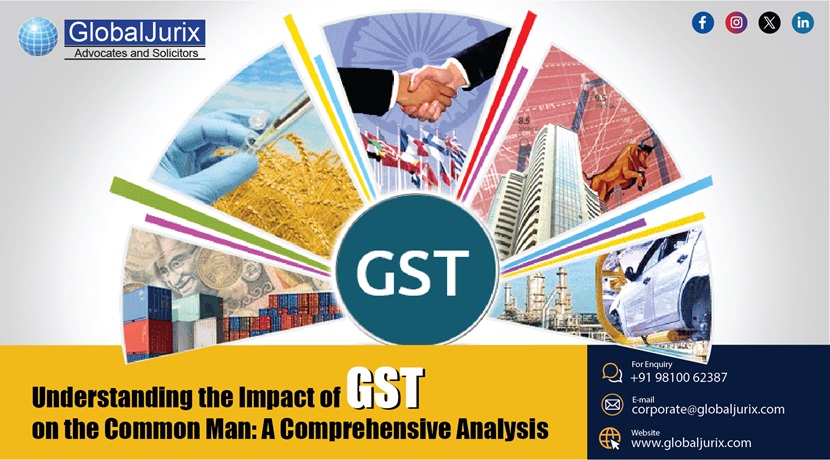Ask Your Legal Query

The Goods and Services Tax (GST) was implemented in India on July 1, 2017 with an objective to introduce to streamline the indirect tax system efficiently in the country. GST is a transformative reform that simplified taxation and proposed more transparency with unifying Indian market. However, it's impact on the Indian Economy and Common man has always been a matter of debate .Perhaps, there is no denying to the fact that GST has systematized the taxation Policy in the country. This blog gives you a multifaceted approach and effect on the lives of ordinary citizens.
Positive Impact of GST on the Common Man
- Simplified Indirect Taxation Structure: This taxation policy eliminated the hassle of various taxes like service tax, value added Tax(VAT) and excise duty.GST is a single tax aimed at simplifying the business compliance and reduce burden on consumers as well.
- Price Stability and Inflation: GST ensured low inflation rate and price stability.GST revoked all cascading taxes thereby reducing tax burden on goods and services.GST eventually contributed to moderating inflation by streamlining supply chains and reducing tax evasion.
- Consumer Impact: GST had a mixed impact on the consumers. While certain goods and services became cheaper due to lower tax rates under GST, others experienced price increases. Essential commodities / necessary goods such as food grains, dairy products, and healthcare services were largely exempted or taxed at lower rates, benefiting the common man. On the other hand, the tax rates on items such as smart phones , electronics, and luxury goods witnessed an uptick, impacting consumer spending patterns.
- Boost to Formalization and Compliance: With the effect of GST , it became mandatory for many small business units to get themselves registered therefore controlling over tax evasion. With implementation of GST many small traders were put under the tax lenses thereby contributing to more transparent and accountable business environment benefiting consumers through improved quality standards and customer service.
- Integrated tax system GST wiped off other taxes like CST, VAT, service tax, SAD, CAD, excise, etc.
- GST - One tax for goods and services without escaping taxation policy.
- Manufacturers and traders got benefit from GST thereby subsequently declining in the price of commodity.
- Because of low manufacturing cost some products like FMCD like cars, FMCG, and other commodities will be cheaper.
Role of Goods and Service tax:
- Boost to formalization and Compliance: GST brought millions of small businesses into the formal economy by mandating registration for entities with turnover above a certain threshold. This formalization of the economy not only widened the tax base but also enhanced compliance, thereby curbing tax evasion. While the transition was challenging for many small traders initially, it ultimately contributed to a more transparent and accountable business environment, benefiting consumers through improved quality standards and customer service.
- SMEs and MSMEs: Small and Medium Enterprises (SMEs) and Micro, Small, and Medium Enterprises (MSMEs) form the backbone of India's economy, providing employment to millions. The implementation of GST posed significant challenges for these businesses, particularly regarding compliance and technology adoption. However, over time, GST has incentivized MSMEs to embrace digitalization and formalize their operations, enabling them to compete more effectively in the market.
- Ease of Doing Business: The introduction of GST streamlined inter-state trade and eliminated entry barriers, fostering a more conducive environment for business growth. The abolition of entry taxes and checkpoints reduced logistical bottlenecks, leading to faster movement of goods across state borders. This ease of doing business not only benefited businesses but also translated into cost savings that could eventually be passed on to consumers.
- Impact on Services: The services sector, which accounts for a significant portion of India's GDP, underwent a transformational change with the implementation of GST. Prior to GST, services were taxed under a complex system of state and central levies. GST brought uniformity to the taxation of services, facilitating ease of compliance and reducing tax arbitrage. While certain services experienced a marginal increase in tax rates, the overall impact on consumers was relatively neutral, with the benefits of simplified taxation outweighing any minor price adjustments.
- Challenges and Areas for Improvement: Despite its numerous benefits, GST has faced criticism on several fronts. Complex compliance requirements, frequent changes in tax rates, and technological challenges have posed hurdles for businesses, especially small traders. The multiplicity of tax rates and classification issues have also led to confusion and administrative burdens. Additionally, the GSTN (Goods and Services Tax Network), the IT backbone of GST, has encountered technical glitches, affecting taxpayer services and compliance.
The impact of GST on the common man has been multifaceted. While the reform has simplified taxation, boosted formalization, and enhanced ease of doing business, challenges remain in terms of compliance, technology, and administrative efficiency. Moving forward, addressing these challenges and fine-tuning the GST framework will be crucial to realizing its full potential in fostering inclusive growth and improving the lives of ordinary citizens. As India continues its journey towards economic progress.
Also Read:
GST in E-Commerce: Impacts, Advantages, and Challenges
Is GST Successful? Let's Found Its Pros and Cons
Top Five Advantages of GST Registration for Startups in India
Global Jurix
S-191 C, 3rd floor, Manak Complex
School Block, Shakarpur
New Delhi - 110092, India
Call at +91-98100-62387
Mail at: corporate@globaljurix.com
